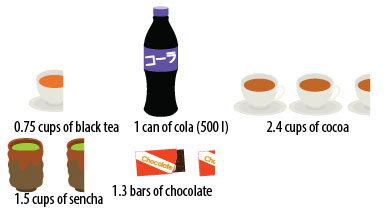Tokyo Food Safety Information Center » Tokyo Metropolitan Government food safety FAQ » I’ve heard that drinking coffee can affect the fetus of a pregnant woman; is this true?
I’ve heard that drinking coffee can affect the fetus of a pregnant woman; is this true?

I’ve heard that drinking coffee can affect the fetus of a pregnant woman; is this true?
- I’ve been told that cocoa and chocolate also contain caffeine. Should I restrict the amount my child gets?
- What foods and drinks contain caffeine?

Drinks which contain caffeine such as coffee and tea are drank for pleasure but may also be drank for the ability of caffeine to fight sleepiness. The amount of caffeine required to exhibit an effect varies greatly from person to person and no level has been established either in Japan or other countries concerning the amount of caffeine which may be consumed daily for long periods of time without exerting a negative influence on health.
The Food Safety Council, which evaluates food risks, has not evaluated the risks of caffeine intake from foods and drinks as of this time. Some countries outside Japan, however, have investigated the health effects of caffeine and have established recommended intake limits for pregnant women. Pregnant women are encouraged to avoid excessive intake of caffeine.
In addition, some countries have established recommended intake limits on caffeine for children. Please take care to ensure that your children do not consume excessive amounts of tea or chocolate in single sittings.
Many commercially available drinks list the amount of caffeine they contain, so be sure to check product labels.

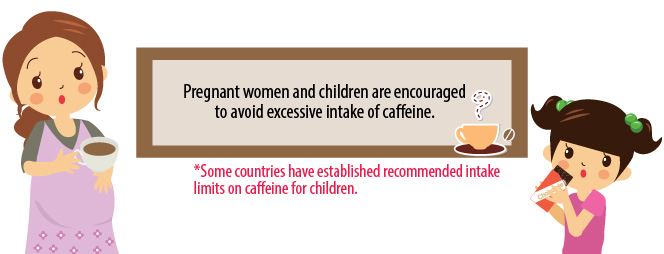
In addition, caffeine is used as a pharmaceutical for sleep prevention, vasodilation, and migraines and hypertension headaches, and pharmaceuticals for these purposes may contain between 100 and 300 milligrams of caffeine per dose (which may be taken 2 or 3 times per day).
Caffeine can strengthen or inhibit the effect of other pharmaceuticals. Be sure to avoid overconsumption of caffeine and, if concerned, consult with a doctor or pharmacist.
Outside Japan, there are countries and international organizations which have established guidelines for the amount of caffeine consumed through food and drink.
World Health Organization
Although definitive effects of caffeine on the fetus have not been determined as yet, pregnant women should limit coffee intake to three to four cups per day.
UK Food Standards Agency
Overconsumption of caffeine by pregnant women may result in low birth weight and increased health risks in the future. Pregnant women should limit caffeine consumption to 200 milligrams per day. In addition, evidence exists suggesting the possibility that high concentrations of caffeine can cause spontaneous abortion.
Health Canada
As overconsumption of caffeine can cause insomnia, headache, irritability, dehydration, and tension, caution should be exercised particularly with children and pregnant and nursing mothers.
No health effects should be observed in a healthy adult who consumes less than 400 milligrams per day.
In addition, as there is a high risk of caffeine affecting child behavior and in the reproduction of women of reproductive age, maximum daily amounts for caffeine believed not to have a negative affect are 45 milligrams for children ages 4 to 6, 62.5 milligrams for children ages 7 to 9, 85 milligrams for children ages 10 to 12, and 300 milligrams for pregnant and nursing women and women planning on becoming pregnant.
Australian Department of Health Food Safety
Pregnant and nursing women such exercise caution and keep intake of caffeine low and are warned not to exceed 300 milligrams per day.
Korea Food and Drug Administration
Children should consumer no more than 2.5 milligrams of caffeine per kilogram of body weight, adults 400 milligrams, and pregnant women 300 milligrams.
Table: Overview of recommendations concerning caffeine outside Japan
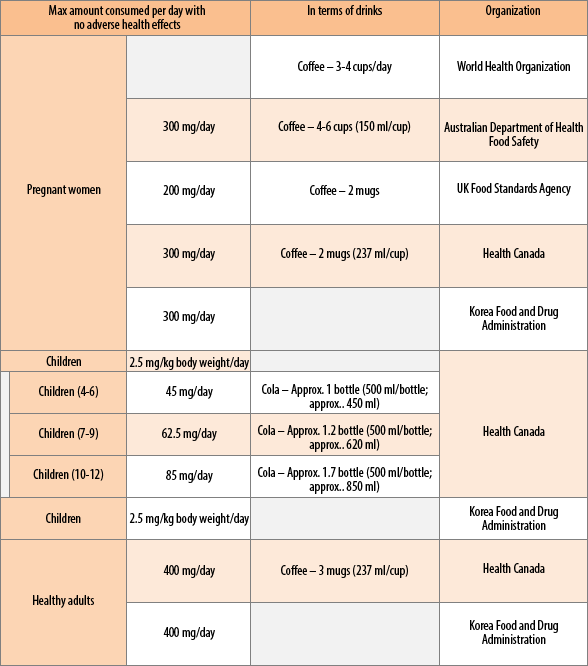
Common foods and drinks which contain significant amounts of caffeine
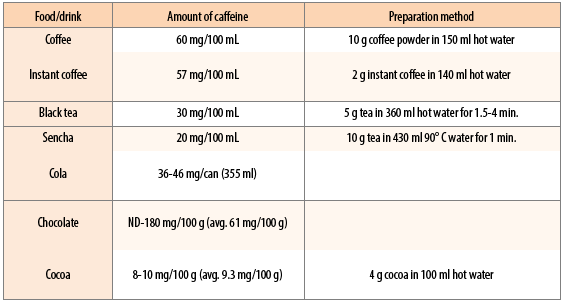
Caffeine in commercially available drinks according to a March 2014 survey
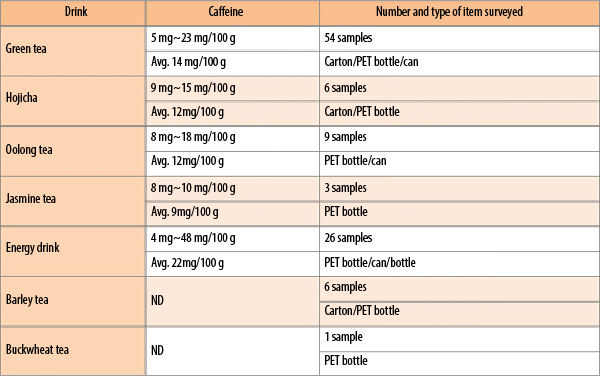
ND = not detected
Caffeine was not found in tea drinks which did not include tea leaves such as barley and buckwheat teas.
The diagram below shows the amounts in terms of the recommended daily intake limits established by organizations outside Japan.
1 cup = 200 ml; 1 teacup = 150 ml; 1 can = 355 ml; 1 bar chocolate = 55 g
Caffeine amounts: Cola = 46 g/can; chocolate = 61 mg/100 g; cocoa = 9.3 mg/100 g
200 mg/day for a pregnant woman
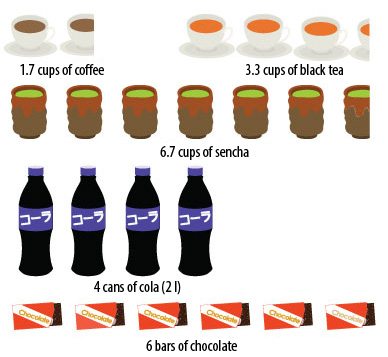
45 mg/day for a child (4-6)
